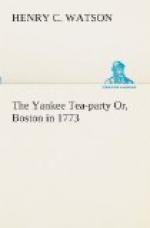“Grey was known as the no-quarter General, I believe,” said Hand.
“Yes,” said Davenport; “and he was always selected to do the bloodiest work—the hangman of the enemy, as we might say.”
“Hang Tarleton and Grey,” said Hand. “Tell us something of our own men. Did either of you ever see Henry Lee? he was always one of my favourite heroes.”
LEE’S LEGION.
“Oh! yes,” said Kinnison, “I frequently saw Lee, before he went south with his Legion. He was a noble-looking young man, with the judgment of a skilful general, and the fire of a natural soldier. I knew several of his men, who were with him through the whole campaign, under General Greene. You may have heard what Greene said of him. Speaking of the principal officers under him, he said Colonel Lee was the eye of the army, and Colonel Washington its arm; and he afterwards said that he was more indebted to Lee’s judgment and activity for success, than to the qualities of any other officer. It was Lee who advised Greene to recross the Dan, and pursue Cornwallis in North Carolina. Even Tarleton was very careful to keep out of the Legion’s reach, when numbers were anything like equal.”
“I always liked Henry Lee,” said Warner. “But he was too severe sometimes. See how he slaughtered the Tories with Colonel Pyle at their head.”
“Yes, he cut the poor rascals to pieces,” said Pitts. “I heard that about three hundred out of four hundred men were butchered on that occasion.”
“It’s a fact,” said Kinnison; “but I can’t think Lee was too cruel there. You see, it’s often necessary to strike a heavy blow to effect an object; and Lee wanted to put an end to the movements of the tories, who were collecting in great numbers to join Cornwallis. There was no better way than the summary one he adopted, of making them feel the consequence of being traitors to their country and to freedom.”
“It served them just right,” said Davenport.
“I don’t wish to defend the tories,” said Hand; “but I think in many instances, great injustice was done to them. Many of them were honest, true-hearted men, who didn’t think as the Whigs did, or whose thinking did not lead them to the same conclusion. I scarcely think such men could be called traitors to their country.”
“No; you talk very well,” said Davenport; “but if you had suffered from them, you would have hated the tories just as much as we did.”
“Well, don’t dispute about it,” said Kinnison. “We were talking of Colonel Henry Lee, and his brave Legion. Cornwallis said he never felt secure while Lee was anywhere in his neighbourhood; and that he knew how to seek the weak points of an enemy and strike a blow as well as any partisan officer he ever knew. He feared Lee as much as Tarleton feared the night-attacks of the Swamp-Fox, Marion. My friends in the Legion told me that Lee had as daring and enterprising officers under his




